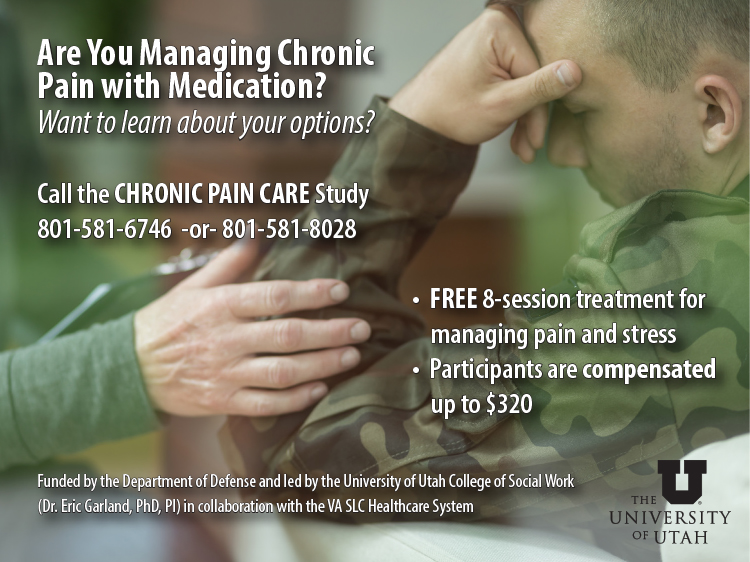Veterans Deserve MORE

By Stephanie Dawson Pack, MEd, PR/Marketing Assistant, University of Utah College of Social Work
When Michael Plourde walked into a training for the pain management intervention Mindfulness-Oriented Recovery Enhancement (MORE), he didn’t expect it to have much of an impact on his life. A natural skeptic, he didn’t think mindfulness was going to do much to address his chronic pain. But he didn’t want to become dependent on opioids—he knew the potential dangers of continued use. So when the training opportunity opened up, thanks to his military veteran status (he is a third generation Marine and served four years in active duty), he was eager to give it a try.
Several years down the road, Mr. Plourde says he can’t thank the MORE facilitators enough. Mr. Plourde suffers from a neuropathic condition that causes severe pain attacks in his hands and feet. Before MORE, he would feel this “lightening pain” and would panic, scrambling to find his medication. Now, he doesn’t; he doesn’t panic. He doesn’t reach for his medication. “I can still hear my MORE program coordinator’s voice in my head,” said Mr. Plourde. “I stop, I remember his voice, and it helps me get through that moment, whatever it’s about.” He says MORE centers and calms him through his difficult moments of the day. Whether he’s trying to still his shaking hands or navigate a moment of frustration, MORE training has made a huge difference in how he approaches his life. “MORE has made me a better person.”
So, what is MORE? It’s a new form of therapy that was developed by Eric Garland, associate dean for research and director of the Center on Mindfulness and Integrative Health Intervention Development (C-MIIND) at the College of Social Work. The Center’s mission is to develop, test, optimize, and disseminate mindfulness and other integrative health interventions for chronic, complex health and mental health problems that have not yet been solved by traditional medical approaches, including chronic pain. MORE is a treatment specifically designed to help people suffering from chronic pain and opioid addiction using mindfulness techniques. One of the major grants in C-MIIND is funded by the Department of Defense and designed to assess the effectiveness of MORE as a treatment to reduce chronic pain and opioid dependence among veterans and active duty military service members.
While Dr. Garland has studies using MORE with both veterans and civilians, he finds his work with veterans particularly meaningful. “Veterans have served us. We owe it them to serve them as well,” he said. Dr. Garland explained that veterans are a population especially prone to co-occurring issues—pain, substance use disorders, depression, anxiety, PTSD. “Some of them have gone through a lot in their lives,” said Dr. Garland. "They need a treatment that can address these multiple problems simultaneously.” And MORE makes sense. “Mindfulness is a form of mental discipline. People who have served in the military are trained to be disciplined. Mindfulness and veterans are a natural fit.”
Mr. Plourde says he tries to be an advocate for MORE in his daily life. He tells his family about it, fellow vets, anyone he can. “I’m not the salesman type, but if I believe in something, I will give you every bit of knowledge I have on it,” said Mr. Plourde. “I believe in MORE.”

